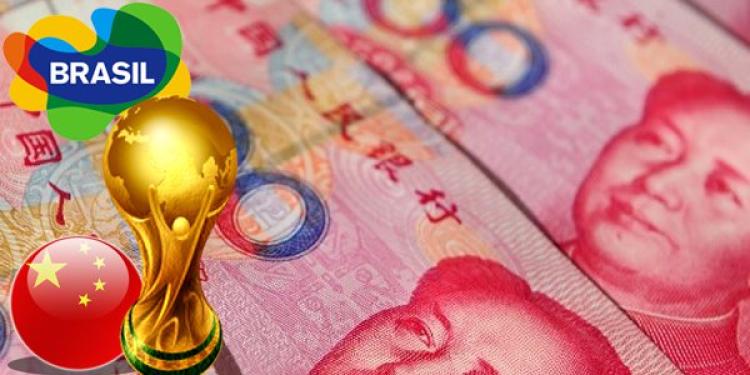Betting on the World Cup in Restrictive Market: How Chinese Companies Circumvent the Law
Posted: July 7, 2014
Updated: October 4, 2017

Chinese technology giants find ways to circumvent gambling laws and allow people to bet on the World Cup.
The world is glued to the TV screens watching the World Cup in Brazil drawing to a close, fans in China are also following the events passionately. And while in most parts of the world betting on football matches is perfectly legal, Chinese gambling laws prohibit such activity for all mainland residents.
And of course there are daily stories of how the Chinese police busted an illegal ring or closed down yet another underground betting operation. People will still want to wager a penny or two even though there are no legal ways to find online sportsbooks in China.
The only legal way for Chinese citizens to gamble in the country is at operators run by the government, which are basically limited to lotteries. However, technology giants and insurance companies are finding their own ways around the laws and allow people who want to bet on sports in China to do so.
Both technology companies offer smartphone and tablet apps, which provide access to World Cup betting and are hugely popular with Chinese punters. While betting of the World Cup in South Africa four years ago has reached 2.3 billion yuan, legal betting this year is expected to reach 10 billion yuan or roughly $1.6 billion. But of course a lot more will be wagered through illegal streams.
A bettor from Shanghai had the following comments to share: "I find it so much easier to bet on an app, rather than having to go to a lottery center. I love the World Cup, but being Chinese, we have little way to get involved other than to bet."
Interestingly enough, neither Alibaba nor Tencent possess gambling licenses, but they still capitalize on betting since they are acting as platforms for provincial lotteries, which do have the required licenses.
Alibaba uses its e-commerce shopping platform, Taobao, to promote World Cup betting. Their cut is seven percent of funds wagered through their website. Looking at their odds, it’s safe to say that the lines offered at the majority of worldwide betting sites are much more generous than the Chinese ones.
Besides the technology giants, World Cup betting opportunities are also taken advantage of by big insurance companies. As such, An Cheng Insurance is offering “heartbreak” insurance policy in the form of Taobao credits for punters to be collected should their team be eliminated from the World Cup.
But of course such moves are frowned upon by the authorities. Only last week the country’s gambling regulator issued a note stating that "insurance products with gaming character should be suspended." Some companies have pulled World Cup related offers, but some still continue to take advantage of the competition.
Considering the sheer number of people wanting to bet, and restrictions by the government, there’s a huge market for illegal betting operators. The International Centre for Sport Security have issued a warning back in May that criminal groups are laundering around $140 billion annually through illegal sports betting, and many punters involved in these activities come from China.
Back in May this year, Shanghai police detained 63 people for running an illegal online gambling operation, estimated to have a 113 billion yuan annual turnover. In the Southern province of Guangdong there were close to 60,000 suspects arrested during raids in the months leading up to the World Cup.
A student from Guangdong has committed suicide after losing over $3,000 betting on the World Cup. He was not the only casualty of the World Cup betting craze, as a 32-year-old woman was also reported to end her life after losing over $16,000 in bets.
The associate professor at the Macao Polytechnic Institute, Huang Guihai, had the following words about gambling addiction: "There should be awareness training to let the public know of the potential risk of gambling becoming addictive. With gambling, the rules favor the casinos, favor the lottery agencies. They provide this entertainment service for profit."
The world is glued to the TV screens watching the World Cup in Brazil drawing to a close, fans in China are also following the events passionately. And while in most parts of the world betting on football matches is perfectly legal, Chinese gambling laws prohibit such activity for all mainland residents.
And of course there are daily stories of how the Chinese police busted an illegal ring or closed down yet another underground betting operation. People will still want to wager a penny or two even though there are no legal ways to find online sportsbooks in China.
The only legal way for Chinese citizens to gamble in the country is at operators run by the government, which are basically limited to lotteries. However, technology giants and insurance companies are finding their own ways around the laws and allow people who want to bet on sports in China to do so.
Circumventing the gambling laws
How Chinese companies are finding ways around the laws to allow people to gambleFinding the way around the laws in China is not easy, but big companies like Alibaba and Tencent have managed to innovate in this field as well. In order to take advantage of the vast number of punters wishing to bet on the World Cup, the companies have joined up with the state-run provincial lotteries allowing bettors to enjoy best value World Cup bets.
• Chinese gambling laws prohibit gambling for the population
• However, big Chinese companies still find way to allow people to bet
• World Cup betting is extremely popular with Chinese punters
Both technology companies offer smartphone and tablet apps, which provide access to World Cup betting and are hugely popular with Chinese punters. While betting of the World Cup in South Africa four years ago has reached 2.3 billion yuan, legal betting this year is expected to reach 10 billion yuan or roughly $1.6 billion. But of course a lot more will be wagered through illegal streams.
A bettor from Shanghai had the following comments to share: "I find it so much easier to bet on an app, rather than having to go to a lottery center. I love the World Cup, but being Chinese, we have little way to get involved other than to bet."
Interestingly enough, neither Alibaba nor Tencent possess gambling licenses, but they still capitalize on betting since they are acting as platforms for provincial lotteries, which do have the required licenses.
Alibaba uses its e-commerce shopping platform, Taobao, to promote World Cup betting. Their cut is seven percent of funds wagered through their website. Looking at their odds, it’s safe to say that the lines offered at the majority of worldwide betting sites are much more generous than the Chinese ones.
Betting offers
China Internet Network Information Center estimates there are over 500 million people in the country, who access internet from their smartphones and tablets. And in most cases betting sites can be accessed from these devices as well. Huang Guihai, associate professor at the Macao Polytechnic Institute commented: "The law is quite strict in China, but gaming opportunities are very accessible to anyone who has a smartphone."Besides the technology giants, World Cup betting opportunities are also taken advantage of by big insurance companies. As such, An Cheng Insurance is offering “heartbreak” insurance policy in the form of Taobao credits for punters to be collected should their team be eliminated from the World Cup.
But of course such moves are frowned upon by the authorities. Only last week the country’s gambling regulator issued a note stating that "insurance products with gaming character should be suspended." Some companies have pulled World Cup related offers, but some still continue to take advantage of the competition.
Illegal betting in China
The majority of betting on sports in China is still taking place through illegal websites, where punters can enjoy more attractive odds and even credit opportunities. Wang Xuehong, head of the Lottery Research Institute at Peking University, said: “The issue of illegal gambling is particularly serious during the World Cup. It is difficult to carry out measures to deal with it, and it is difficult to supervise Internet activities."Considering the sheer number of people wanting to bet, and restrictions by the government, there’s a huge market for illegal betting operators. The International Centre for Sport Security have issued a warning back in May that criminal groups are laundering around $140 billion annually through illegal sports betting, and many punters involved in these activities come from China.
Back in May this year, Shanghai police detained 63 people for running an illegal online gambling operation, estimated to have a 113 billion yuan annual turnover. In the Southern province of Guangdong there were close to 60,000 suspects arrested during raids in the months leading up to the World Cup.
Fatal consequences of illegal betting
Even though there are some legal ways for Chinese population to bet on the World Cup, some are still turning to underground facilities. And in some cases this may lead to dire consequences for punters getting indebted to criminals.A student from Guangdong has committed suicide after losing over $3,000 betting on the World Cup. He was not the only casualty of the World Cup betting craze, as a 32-year-old woman was also reported to end her life after losing over $16,000 in bets.
The associate professor at the Macao Polytechnic Institute, Huang Guihai, had the following words about gambling addiction: "There should be awareness training to let the public know of the potential risk of gambling becoming addictive. With gambling, the rules favor the casinos, favor the lottery agencies. They provide this entertainment service for profit."
Related content
Subscribe
0 Comments












